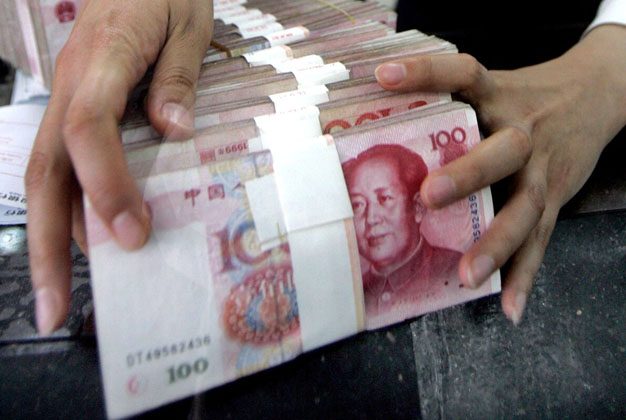Recent Posts
- Chart: China’s Most Important Export Partners
- China’s Billions Help Xi Make Useful Friends in Eastern Europe
- Infographic: Interest Rate Forecasts for Advanced Economies
- China Is Close to Leading in Robotics Innovation, New ITIF Analysis Finds
- In Pictures: Food of Ando in Hong Kong
- Chart: China’s Juvenile Offenders Surge As Criminal Convictions Rise
- Time Is a Thief
- Infographic: The Most Valuable Companies in Major EU Economies
- Simulated Chemistry: New AI Platform Designs Tomorrow’s Cancer Drugs
- Humour
- Chart: The Most Common Cancers in the U.S.
- A Brief History of Brainwashing
- Chinese Listed Companies’ Profits Drop for the First Time in Five Years
- AI Might Spot Rare Diseases in Patients Years Earlier
- Humour: News in Cartoon
- Infographic: The Top 20 Countries in Debt to China
- To Make Sure Grandmas Like His Don’t Get Conned, He Scams the Scammers
- Chart: Streaming is Slowly Reviving the U.S. Music Industry
- China Home Sales Keep Falling as Top Officials Pledge Support
- Chart: Hong Kong Number and Dollar Amount of Negative Equity Mortgage Cases Rose in Q1 2024
- Chart: China Manufacturing Activities Continues to Expand in April 2024
- Chart: Local Car Companies Outsold Joint Ventures in China
- In Pictures: 2022 Bugatti Chiron Pur Sport
- Overseas Investment Through China’s Stock Connect Nearly Doubles 2023’s Total
- Infographic: How Hard Is It to Get Into an U.S. Ivy League School?
- Hit Songs Are Getting Shorter
- Charts: Apple Suppliers by Countries
- Chart: AI Startups Lead China’s Unicorn Herd
- Chart: U.S. Wages Have Outpaced Inflation Since 2020
- Chuckles of the Day
- Infographic: AI Patents by Country
- Research: ‘Super Agers’ Have Incredibly Sharp Memories
- Mapped: The State of World Press Freedom
- Japan’s Debt Dilemma May Doom Any FX Intervention
- Music Video: Best of My Love
- Chart: Amazon Maintains Cloud Lead as Microsoft Edges Closer
- Why Is Gold Rising Now, Where Is It Headed Tomorrow?
- Infographic: Economic Growth Forecasts for G7 and BRICS Countries in 2024
- Putin’s War Will Soon Reach Russians’ Tax Bills
- Humour: News in Cartoon
Archives
- May 2024
- April 2024
- March 2024
- February 2024
- January 2024
- December 2023
- November 2023
- October 2023
- September 2023
- August 2023
- July 2023
- June 2023
- May 2023
- April 2023
- March 2023
- February 2023
- January 2023
- December 2022
- November 2022
- October 2022
- September 2022
- August 2022
- July 2022
- June 2022
- May 2022
- April 2022
- March 2022
- February 2022
- January 2022
- December 2021
- November 2021
- October 2021
- September 2021
- August 2021
- July 2021
- June 2021
- May 2021
- April 2021
- March 2021
- February 2021
- January 2021
- December 2020
- November 2020
- October 2020
- September 2020
- August 2020
- July 2020
- June 2020
- May 2020
- April 2020
- March 2020
- August 2017
- June 2017
- May 2017
- March 2017
- February 2017
- January 2017
- December 2016
- November 2016
- October 2016
- September 2016
- August 2016
- July 2016
- June 2016
- May 2016
- April 2016
- March 2016
- February 2016
- January 2016
- December 2015
- November 2015
- October 2015
- August 2015
- July 2015
- June 2015
- May 2015
- April 2015
- March 2015
- February 2015
- January 2015
- December 2014
- November 2014
- October 2014
- September 2014
- August 2014
- July 2014
- May 2014
- April 2014
- March 2014
- February 2014
- January 2014
- December 2013
- November 2013
- October 2013
- September 2013
- August 2013
- July 2013
- June 2013
- May 2013
- April 2013
- March 2013
- February 2013
- January 2013
- December 2012
- November 2012
- October 2012
- September 2012
- August 2012
- July 2012
- June 2012
- May 2012
- April 2012
- March 2012
- February 2012
- January 2012
- December 2011
Categories
- Aging
- Analysis
- Art
- Banking
- Bond
- Business
- Classic Car
- Climate
- Commercial Real Estate
- Commodity
- Construction
- Consumption
- Culture
- Currency
- Debt
- Demographic
- Economy
- Education
- Employment
- Energy
- Entertainment
- Environment
- Explainer
- Finance
- Food
- Gold
- Gold Stock
- Health
- History
- Housing
- Humour
- In Pictures
- Infographic
- Information
- Interview
- Investment
- Life
- Links
- Manufacturing
- Medicine
- Michelin Restaurant
- Military
- Monetary
- Money
- Music
- News
- Opinion
- Person
- Personal Wealth
- Policy
- Politics
- Real Estate
- Report
- Research
- Restaurant
- Science
- Services
- Society
- Stock
- Stock Market
- Story
- Study
- Technology
- Tourism
- Trade
- Trading
- Transportation
- Travel
- Uncategorized
- Video
- Wealth
AI
Alzheimer's
Asia
Australia
Battery
Bitcoin
Brain
Canada
Car
Car Sales
Central Bank
China
Cities
Coal
Copper
Countries
COVID-19
COVID-19 Origin
COVID-19 Vaccination
COVID-19 Variant
CPI
Crude Oil
Debt
Dementia
Democracy
Electric Cars
Electricity
Electric Vehicles
EU
Europe
Eurozone
EV
Exercise
Federal Reserve
G7
Gasoline
GDP
Germany
Global
Happiness
Heart Health
Hong Kong
India
Inflation
Interest Rate
Internet
Israel
Japan
Lithium
Media
Military
Mortgage
Oil
Pandemic
PMI
Recession
Retail Sales
Robotic
Russia
S&P 500
Semiconductor
Singapore
Sleep
Smartphone
Social Media
Solar
Taiwan
UK
Ukraine War
US
USD
US Treasuries
Vaccine
World
Yuan





